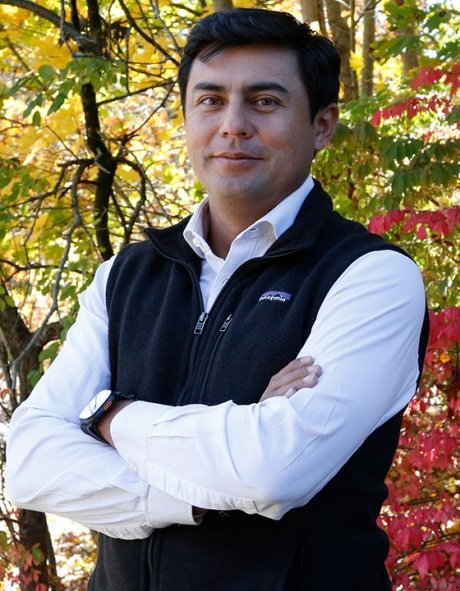
“I want my students to fall in love with Spanish,” says Bellizzia.
With an M.A.T. in world languages education from Rhode Island College, Edilberto Bellizzia ’25 is part of a growing group of international professionals who, through graduate programs or teaching certificates, are helping fill the shortage of multilingual teachers across the country. His journey demonstrates how these programs can transform not only careers but entire communities.
“I chose RIC after considering cost, location and the program’s curriculum. I’ve always had an academic spirit. I really enjoy studying,” says Bellizzia. “The program at RIC is designed to provide strong academic training, but when you combine that with real-world experience, the connection becomes much stronger and that’s exactly what happened to me.”
This 41-year-old broadcast journalist from Colombia never planned to become a schoolteacher.
“I come from a household with little education,” he says, “and I’m the first bilingual in my family. Education has given me immense personal satisfaction. In Colombia, I worked with rural communities as a volunteer project manager at a foundation, designing campaigns on sustainability and climate change. I also gave lectures on creative writing and other subjects in public schools and universities. I’ve always felt comfortable explaining concepts, guiding, listening to people and giving feedback.”
In 2015 Bellizzia arrived in New York City to study English at the New York Language Center. After several months, he returned to Colombia to complete his master’s degree in development management. But the challenge of mastering English kept calling him back to the United States.
In 2018, determined to improve his English and explore new opportunities, Bellizzia settled in Dartmouth, Massachusetts, where he enrolled in the UMass Academic English Program. After one semester, feeling ready for new challenges, he joined the Project Management Certificate Program at Bristol Community College in Fall River, Massachusetts, which provided project-based learning for professionals.
“I started the certificate program in 2019 as an alternative way to improve my English in an academic setting, in a different discipline and context,” he says. “I had taken English classes throughout high school and college, plus nine months in New York and in the UMass program, so I felt ready.”
During a five-month internship as a project assistant at Bristol Community College, Bellizzia started looking into the possibility of teaching in the United States. “A good friend used to tell me I should be a teacher, that I explained things well,” he says. “I guess my passion for teaching had always been there. I realized that education could be a way to connect everything I cared about – communication, culture and community.”
That realization marked the beginning of a new chapter in his life.
Bellizzia enrolled in the World Languages Education Program at Rhode Island College, which enabled him to apply for emergency certification to teach. (Emergency certification is a temporary teaching license issued by the state while the individual is in the process of completing traditional teaching certification requirements.)
With an emergency certification, Bellizzia was able to teach an environmental science class at Nuestro Mundo Public Charter School in Providence.
“That position brought together all my academic background,” he says. “I was teaching environmental topics in Spanish through project-based learning. It connected everything I knew and loved.”
Looking back at his tenure at Rhode Island College, he says, “The direct interaction with other colleagues, also Hispanic, was fundamental for me. RIC has been my best academic experience. The professors are highly qualified. Professor Jeremy Benson is by far the best educator I’ve ever had. And believe me, I’ve had many.”
Three years ago, Bellizzia found true fulfillment in teaching his mother tongue and helping middle school students discover the cultural richness and diversity of the Spanish language at Wilbur and McMahon School in Little Compton.
“My first year teaching in the language acquisition program was tough,” he says. “But my training at RIC has shaped my teaching philosophy, my classroom performance and my constant adaptation to my students’ diverse learning styles. Today, I consider myself a more structured teacher in terms of pedagogical tools and content selection, largely thanks to the training I received in the master’s program.”
Wilbur and McMahon School is a small, rural school with a largely non-Spanish-speaking population. Bellizzia feels deeply connected to his students and the community. His fifth-to-eighth-grade classes come alive with music, art and laughter. He is also the school’s soccer coach.
“In my teaching, I use music – merengue, bachata and tango – and show the ways they are danced. We learn about the variety of fruits and foods from Latin American countries; play board games in Spanish; and talk about geography, artists and the different Hispanic cultures,” he says. “Learning a language isn’t just grammar; it’s joy, identity, discovery. At this point, I feel like I am a Latin American ambassador – a Colombian one.”
For Bellizzia, teaching Spanish is more than a job. It is a bridge between languages and cultures and the two worlds he calls home.
“I want my students to fall in love with Spanish and feel motivated to continue learning it. Not just because it is in the curriculum, but because they feel part of something bigger,” he says. “Teaching is my way of helping others find their own path just as I found mine.”
According to the U.S. Census Bureau, over 42 million people in the United States speak Spanish at home, but only a fraction of non-Hispanic Americans speak it fluently.
Learn more about the M.A.T. in World Languages Program.
